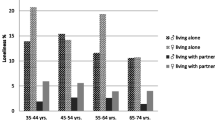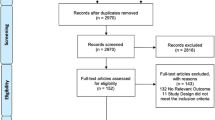Abstract
Background
Hearing difficulties are prevalent among older people and can lead to difficulties in social interaction. These difficulties may increase the tendency to remain at home and withdraw from leisure activities.
Aims
To investigate whether self-reported hearing problems are associated with time spent out-of-home and withdrawal from a leisure activity among older persons.
Methods
Cross-sectional and longitudinal data on 75- to 90-year-old community-dwelling men and women (n = 767) was used. Self-reports of hearing, diseases, and difficulty walking 2 km were obtained via home interviews at baseline, and withdrawal from a leisure activity via 1- and 2-year follow-up telephone interviews. Time spent out-of-home was obtained from a subsample (n = 532) via seven-day diaries at baseline.
Results
Hearing problems were associated with time spent out-of-home (p = 0.025) and withdrawal from a leisure activity (p = 0.025) among persons reporting no walking difficulty, but not among those reporting walking difficulty (p = 0.269 and 0.396, respectively). Among the former, persons with major hearing problems spent significantly less time out-of-home (estimated marginal mean 161 min, 95 % CI 122–212) than those with good hearing (242, 95 % CI 218–270). Persons with major hearing problems also had 3.0 times higher odds (95 % CI 1.3–7.1) for withdrawal from a leisure activity than persons with good hearing during the two-year follow-up.
Discussion and conclusions
Among older adults without walking difficulty, hearing problems may reduce time spent out-of-home and increase the likelihood for withdrawal from a leisure activity. Decreased leisure and out-of-home activity may have negative effects on older persons’ social, mental and physical functioning.
Similar content being viewed by others
References
Lin FR, Thorpe R, Gordon-Salant S et al (2011) Hearing loss prevalence and risk factors among older adults in the United States. J Gerontol A Biol Sci Med Sci 66:582–590
Cruickshanks KJ, Wiley TL, Tweed TS et al (1998) Prevalence of hearing loss in older adults in Beaver Dam, Wisconsin. The Epidemiology of Hearing Loss Study. Am J Epidemiol 148:879–886
Mitchell P, Gopinath B, Wang JJ et al (2011) Five-year incidence and progression of hearing impairment in an older population. Ear Hear 32:251–257
Gussekloo J, de Bont LE, von Faber M et al (2003) Auditory rehabilitation of older people from the general population—the Leiden 85-plus study. Br J Gen Pract 53:536–540
Crews JE, Campbell VA (2004) Vision impairment and hearing loss among community-dwelling older Americans: implications for health and functioning. Am J Public Health 94:823–829
Mikkola TM, Portegijs E, Rantakokko M et al (2014) Association of self-reported hearing difficulty to objective and perceived participation outside the home in older community-dwelling adults. J Aging Health 27:103–122
Cohen-Mansfield J, Shmotkin D, Hazan H (2010) The effect of homebound status on older persons. J Am Geriatr Soc 58:2358–2362
Jacobs JM, Cohen A, Hammerman-Rozenberg R et al (2008) Going outdoors daily predicts long-term functional and health benefits among ambulatory older people. J Aging Health 20:259–272
Fujita K, Fujiwara Y, Chaves PH et al (2006) Frequency of going outdoors as a good predictors for incident disability of physical function as well as disability recovery in community-dwelling older adults in rural Japan. J Epidemiol 16:261–270
Simonsick EM, Kasper JD, Phillips CL (1998) Physical disability and social interaction: factors associated with low social contact and home confinement in disabled older women (the Women’s Health and Aging Study). J Gerontol B Psychol Sci Soc Sci 53:S209–S217
Rantanen T, Portegijs E et al (2012) Individual and environmental factors underlying life space of older people—study protocol and design of a cohort study on life-space mobility in old age (LISPE). BMC Public Health 12:1018
Baraldi AN, Enders CK (2010) An introduction to modern missing data analyses. J Sch Psychol 48:5–37
Menec VH (2003) The relation between everyday activities and successful aging: a 6-year longitudinal study. J Gerontol B Psychol Sci Soc Sci 58:S74–S82
Walter-Ginzburg A, Shmotkin D, Blumstein T et al (2005) A gender-based dynamic multidimensional longitudinal analysis of resilience and mortality in the old-old in Israel: the Cross-sectional and Longitudinal Aging Study (CALAS). Soc Sci Med 60:1705–1715
Pynnönen K, Törmäkangas T, Heikkinen RL et al (2012) Does social activity decrease risk for institutionalization and mortality in older people? J Gerontol B Psychol Sci Soc Sci 67:765–774
Gregg EW, Cauley JA et al (2003) Relationship of changes in physical activity and mortality among older women. JAMA 14(289):2379–2386
Silverstein M, Parker MG (2002) Leisure activities and quality of life among the oldest old in Sweden. Res Aging 24:528–547
Nimrod G, Shrira A (2014) The paradox of leisure in later life. J Gerontol B Psychol Sci Soc Sci. doi:10.1093/geronb/gbu143
Gopinath B, Schneider J, Hickson L et al (2012) Hearing handicap, rather than measured hearing impairment, predicts poorer quality of life over 10 years in older adults. Maturitas 72:146–151
Hawkins K, Bottone FG Jr, Ozminkowski RJ et al (2012) The prevalence of hearing impairment and its burden on the quality of life among adults with Medicare supplement insurance. Qual Life Res 21:1135–1147
Gopinath B, Hickson L, Schneider J et al (2012) Hearing-impaired adults are at increased risk of experiencing emotional distress and social engagement restrictions 5 years later. Age Ageing 41:618–623
Gardner P (2014) The role of social engagement and identity in community mobility among older adults aging in place. Disabil Rehabil 36:1249–1257
Hallberg LR, Hallberg U, Kramer SE (2008) Self-reported hearing difficulties, communication strategies and psychological general well-being (quality of life) in patients with acquired hearing impairment. Disabil Rehabil 30:203–212
Gomez RG, Madey SF (2001) Coping-with-hearing-loss model for older adults. J Gerontol B Psychol Sci Soc Sci 56:P223–P225
Acknowledgments
Gerontology Research Center is a joint effort between the University of Jyvaskyla and the University of Tampere. This study was funded by the Academy of Finland (Grant numbers 263729 and 255403) and the Finnish Ministry of Education.
Conflict of interest
On behalf of all authors, the corresponding author states that there is no conflict of interest.
Ethical approval
All procedures performed in studies involving human participants were in accordance with the ethical standards of the institutional research committee and with the 1964 Helsinki declaration and its later amendments or comparable ethical standards. This article does not contain any studies with animals performed by any of the authors.
Informed consent
Informed consent was obtained from all individual participants included in the study.
Author information
Authors and Affiliations
Corresponding author
Rights and permissions
About this article
Cite this article
Mikkola, T.M., Polku, H., Portegijs, E. et al. Self-reported hearing is associated with time spent out-of-home and withdrawal from leisure activities in older community-dwelling adults. Aging Clin Exp Res 28, 297–302 (2016). https://doi.org/10.1007/s40520-015-0389-1
Received:
Accepted:
Published:
Issue Date:
DOI: https://doi.org/10.1007/s40520-015-0389-1




